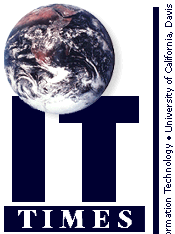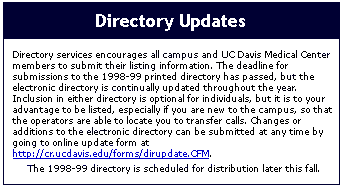
Operators Give UC Davis a Personal Voice
by Richard DarsieCallers to the main UC Davis campus telephone number are often surprised — not to mention relieved and delighted -- to find themselves conversing with a "real person" instead of the all-too-familiar recording. As the first point of contact for the campus, UC Davis' team of telephone operators brings a welcome personal touch to campus communications.
The operators work for Directory Services, a unit of Information Technology's Communications Resources. Directory Services offers a number of functions critical to the campus: keeping the campus and UC Davis Medical Center directory (in both print and electronic form) up to date, ordering calling cards and commercial directories for UC Davis personnel, and answering calls to the main UC Davis telephone number.
Summer is always a busy time for Directory Services, for this is when the campus directory is produced for the upcoming academic year. Pat Elkins, manager of the unit, supervises this huge task, which requires several months of careful coordination, checking and editing.
"Keeping on top of the constant changes in campus departments and employees is a full-time job," says Linda Nixon, Directories Assistant.
A Team at Your Service
While providing directory assistance is an important function, the operators' service to UC Davis goes far beyond this aspect of their duties."We're not just telephone operators — we're the campus information center," says Sandy Peiffer, operator team supervisor.
The operators' job can be challenging. They must fill many roles, from simply redirecting calls to the appropriate campus department to reassuring worried parents of UCD students who haven't heard from their children for too long, helping new students get acquainted with the campus, and troubleshooting difficult or traumatic situations, including the occasional crank call. 911 calls and bomb-threat calls, which should go to the UC Davis Police Department, are occasionally misdirected to the operators. "We face a new challenge every day," says Peiffer, recounting the time when a caller asked for 'Kerry' — no last name known. Miraculously, the operators were able to track her down. On another occasion, late one afternoon, close to 5 p.m., a woman called, desperately seeking a beef marinade recipe for a dinner party that evening!
The operators offer a variety of other telephone services to the campus, including operator-assisted conference calls and calls involving the deaf or hard-of-hearing.
The operators are highly conscious of the importance of good customer service. "We're here to serve the campus and the taxpayers of California," emphasizes Peiffer. This attitude permeates the entire team. They regularly go to great lengths to find answers for their callers, whatever the situation. For example, one caller sought instructions on the use of a home canner she had purchased; the call was quickly referred to the appropriate department: Food Science and Technology.

Humor and Team Spirit
What does it take to be a campus operator? "A sense of humor is essential," says Peiffer. Callers often reach Campus Information after prolonged and frustrating encounters with Voicemail menus elsewhere on campus. Handling annoyed or even angry callers demands restraint, interpersonal skills, and patience. Other valued qualities are grammar and communication skills, as well as a sense of teamwork. New operators train by sitting with experienced staff until they feel comfortable answering calls on their own."Teamwork is so important in this group," says Peiffer. "They're a close-knit group and go out of their way to help each other out." The team as a whole has a wealth of collective information and experience; individually they rely on each other for problem-solving. And, of course, there is a camaraderie that arises from the shared experience of being on UC Davis' "front lines."
Creative Outlets
The operators come from a variety of backgrounds, and many hold other jobs to fill out their work week. They hold professions ranging from animal technician and X-ray technician to church secretary and artist. Many have found a relaxing outlet in creative endeavors like landscape design, seascape paintings, and cartoons.With their operators' headphones on, they quickly switch gears to become computer-savvy, resourceful professionals. The heart of each operator's workstation is a CTI (computer-telephone interface) system that links a multiline phone system to a PC, allowing all the features of the phone system -- plus added speed call features -- to be accessed via the computer. A backup system is in place in case of computer failure. The same computer serves to transfer calls and access the Directory Retrieval System, the electronic version of the directory which is updated daily. The system is very fast and sophisticated, allowing searches to be made by first name, last name, or any portion thereof. It places a vast information resource at the operators' instant disposal when responding to callers' queries. The operators can tell by looking at their monitor whether an incoming call is from on- or off-campus; this information can be crucial in an emergency situation. The database is an important resource for the operators, and so are their formidable powers of recall: an experienced operator knows a requested number from memory about 75% of the time.
The operator team answers an average of 6,000 calls each week. How glad are callers to connect with a real person? According to Peiffer, "one day, someone sang the Hallelujah Chorus!"

Pat Elkins, Zack O'Donnell, Linda Nixon, and Sandy Peiffer from Communications Resources contributed to this article.